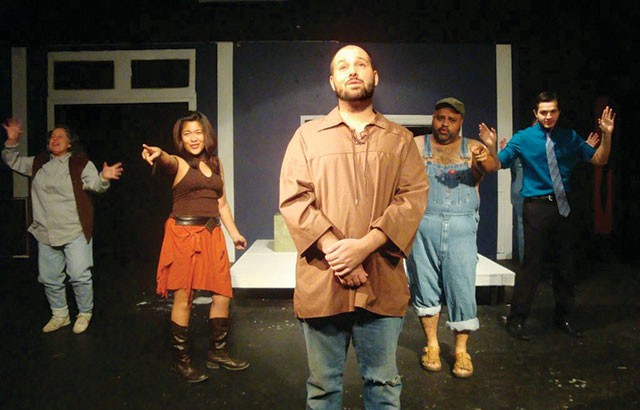Roman playwright Titus Maccius Plautus’ Mostellaria is the rowdy forerunner of Risky Business and other movies in which teens transform their homes into dens of debauchery while their parents are away. Plautus is best known today because Shakespeare filched elements from two of his plays, Menaechmi and Amphitryon, to create The Comedy of Errors. Plautus himself was a literary scavenger, and it is believed that he adapted Mostellaria, written in the 2nd century B.C.E., from a lost comedy by the Greek playwright Philemon. Since the Romans plundered the Greeks for their theater, poetry and philosophy, it is only fair that Mostellaria be recycled into a contemporary American farce titled The Haunted House. Its adapter, Thomas Jenkins, chairs the department of classical studies at Trinity University. He is also a contributing writer to the Current.
Though the production, ably directed by Kyle Gillette, begins with a character addressing the audience in Latin, this raucous entertainment is anything but academic. It transposes the wacky action to a house in San Antonio, where young Gluteus Maximus (“What an ass,” puns one of his slaves) has installed Viagra (Sophie Bolles), a voluptuous flute girl he has purchased after borrowing $40,000. Gluteus’ sodden buddies move in, and a rollicking good time is had by all—until Gluteus’s father Cantakerous (Chris Champlin) suddenly returns by canoe after three years in Fargo, N.D. A cunning slave named Tranio (Rachel Joseph) staves off disaster by duping the old man into believing that his house is haunted.
Much of the merriment is the result not only of a hyperbolically implausible plot but also of deliberately obnoxious wordplay (“Now’s the time for the taming of the shrewd,” says Tranio). Flaunting the adaptation’s anachronisms, characters use cell phones, and one speaks of “going viral on Faceliber.” Topical references abound: “The greatest people on earth,” proclaims Tranio, “are Alexander the Great and Wendy Davis.” But most pervasive is the metatheatricality of the whole thing. Gluteus ostentatiously holds a copy of Plautus’ Mostellaria and later footnotes another character’s comment by observing: “That’s an allusion to Euripides.”
The fact that a couple of actors play multiple roles adds to the lunacy. William Mohammad Razavi doubles as one of Gluteus’ slaves as well as his neighbor, while Chris Kelly is variously Gluteus, Gluteus’ best friend Inebrius, and Inebrius’ slave Phaniscus. Kelly croons a pair of songs composed by Karim Al-Zand with lyrics by Jenkins. One, “Slavery 101,” is a blithe paean to the joys of servitude that echoes the outrageous sentiments and punchy melody of Mel Brooks’ “The Inquisition.”
“San Antonians,” Gluteus announces at the conclusion, “this moronic play is over.” With a dearth of the sage mirth found in comedies by Shakespeare and Molière, we laugh instead at the absurdity of sitting in a theater pretending to take this clever make-believe seriously.
The Haunted House
$10-$14
8pm Thur-Sat, 6pm Sun
The Overtime Theater
1203 Camden
(210) 557-7562
theovertimetheater.org
Through Oct 19
















